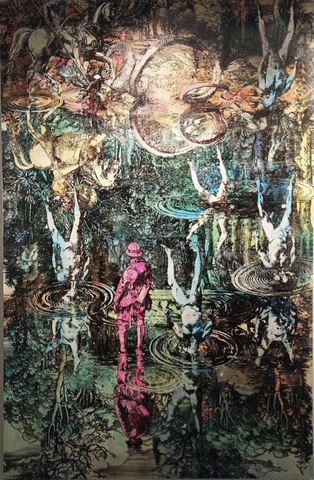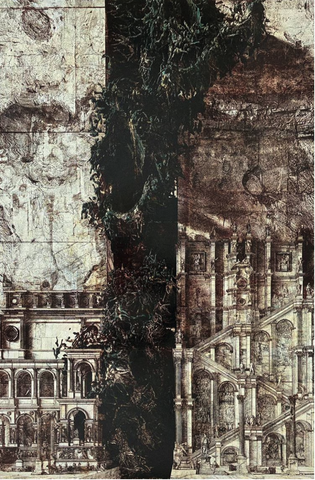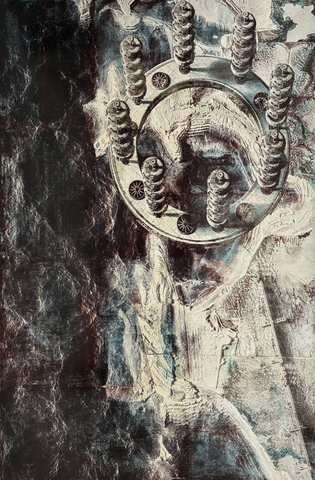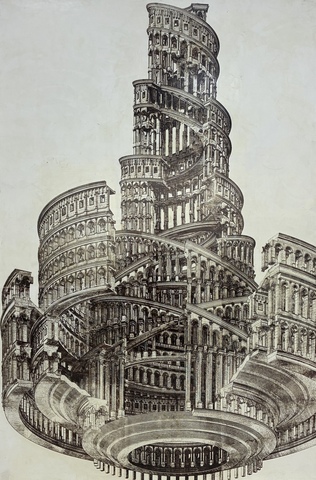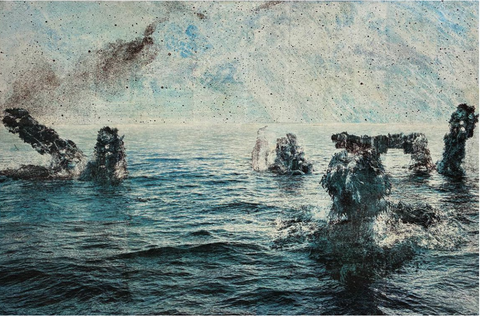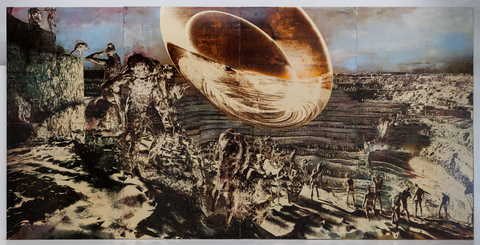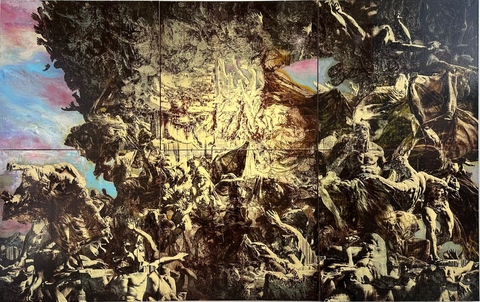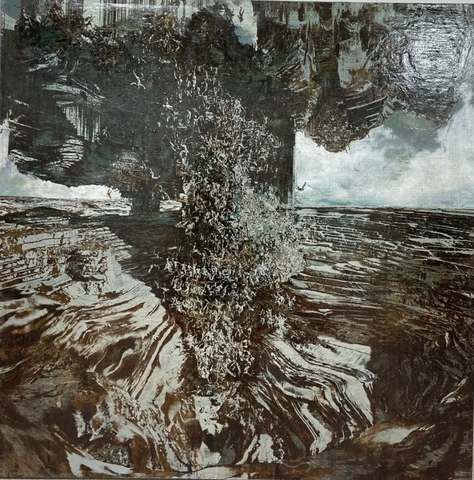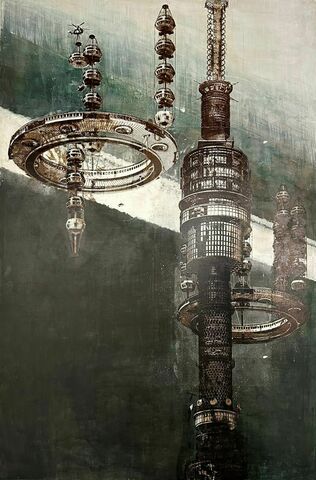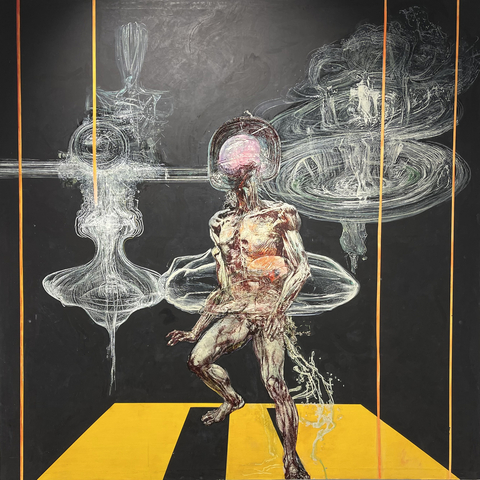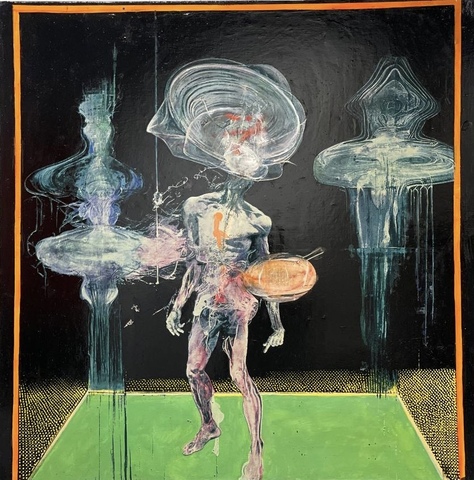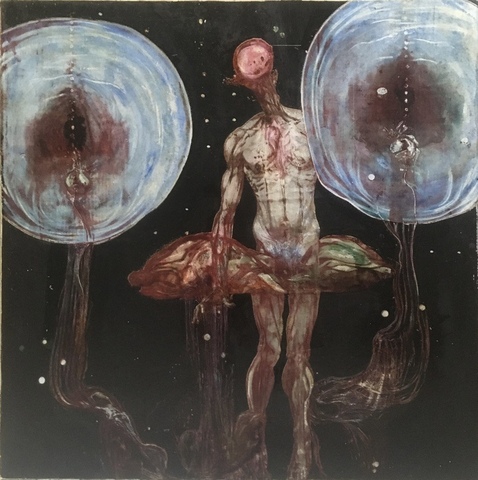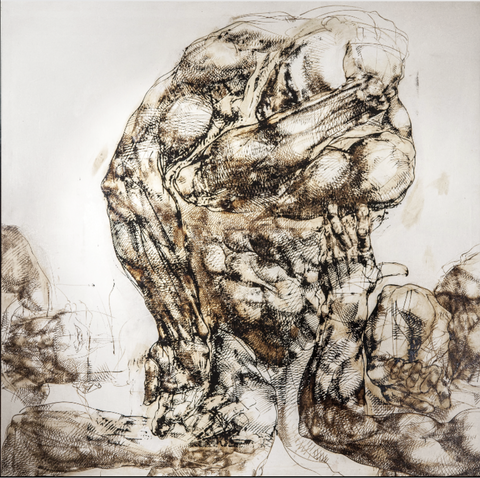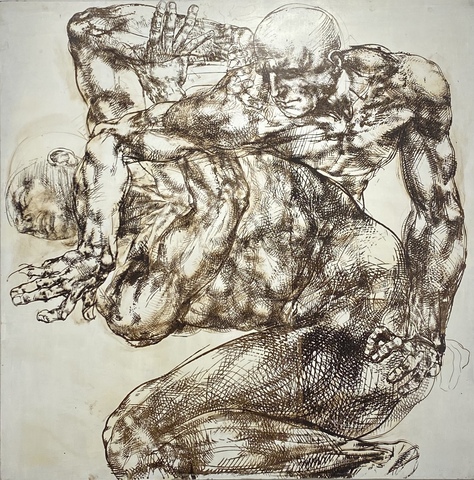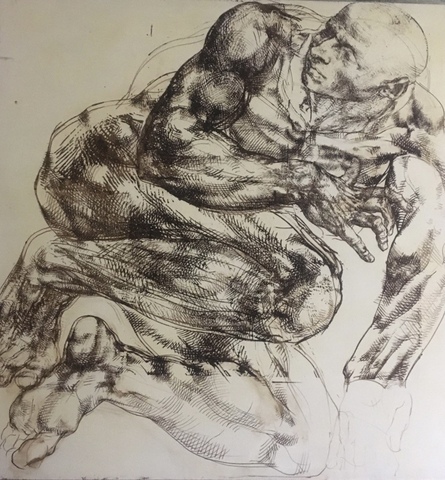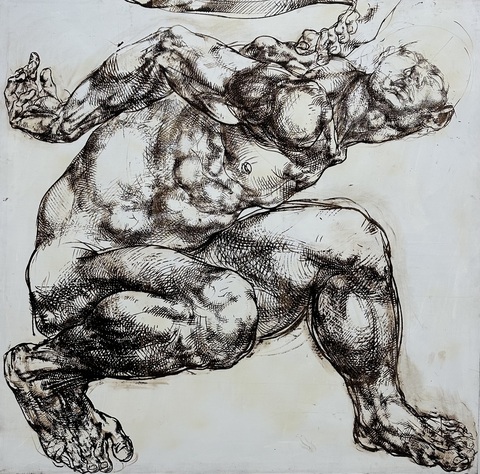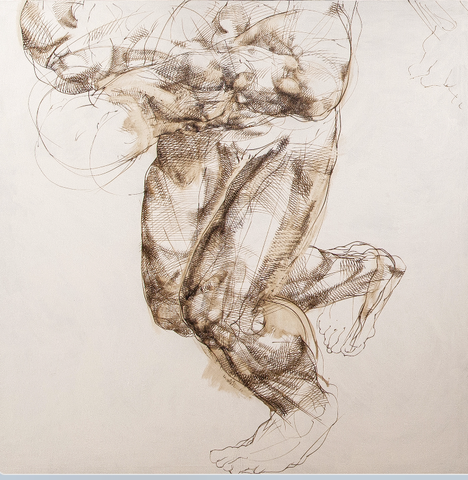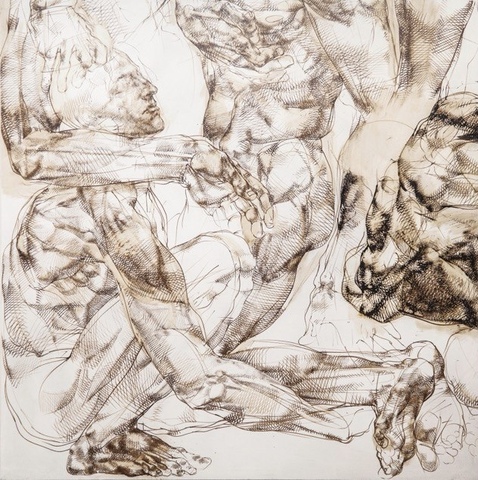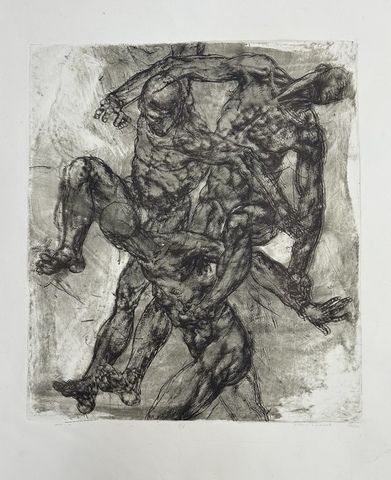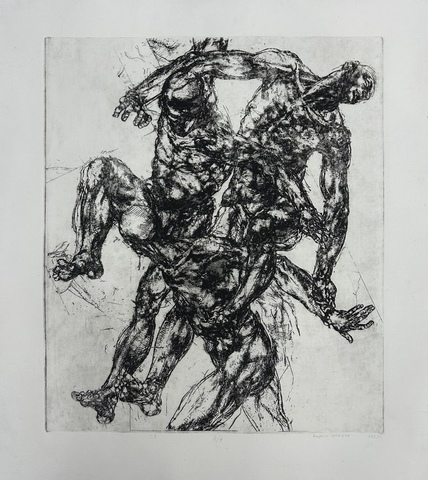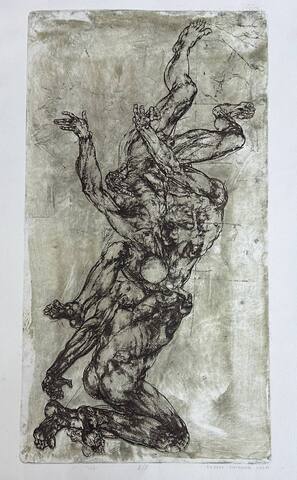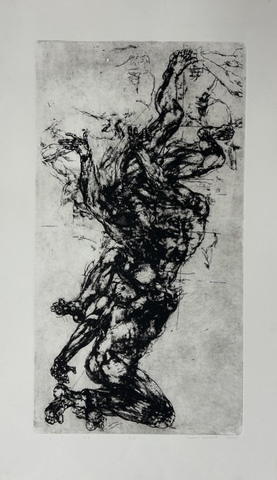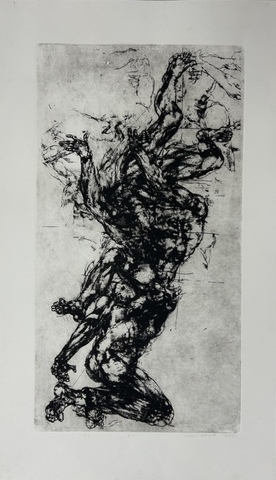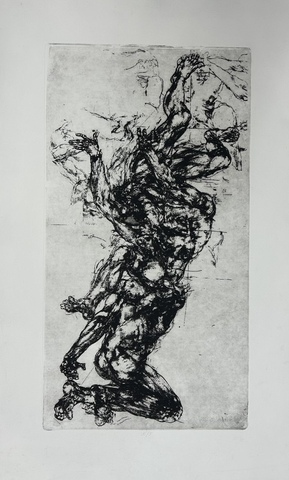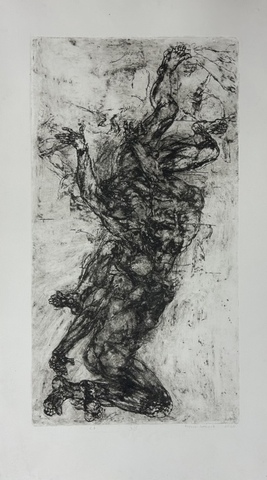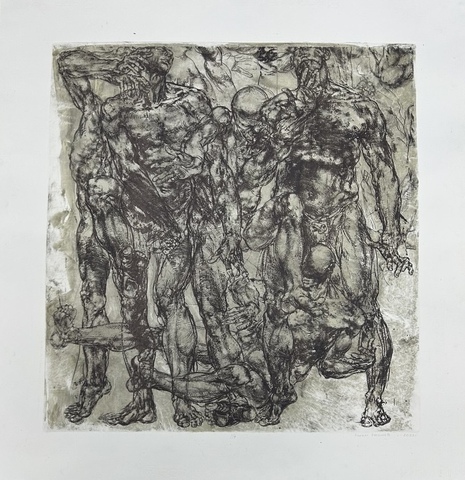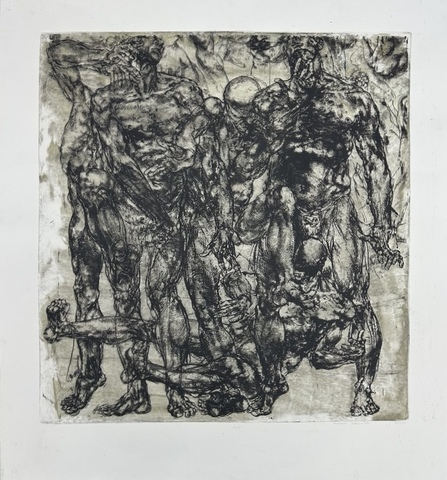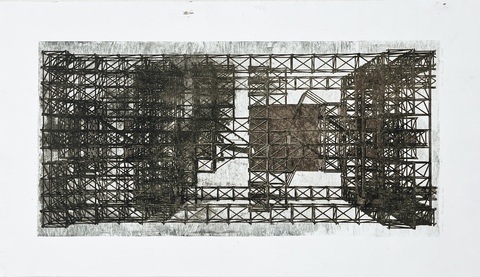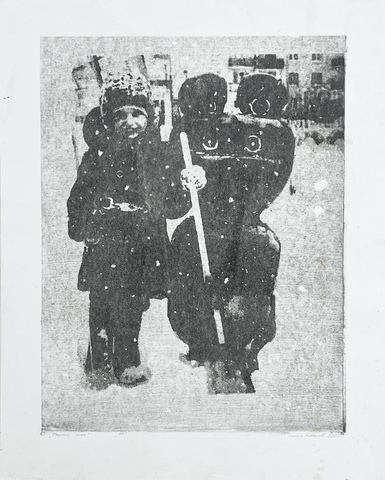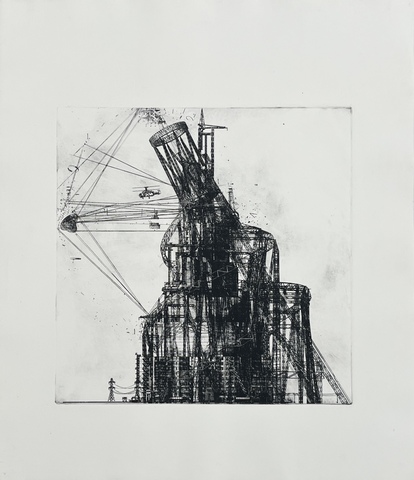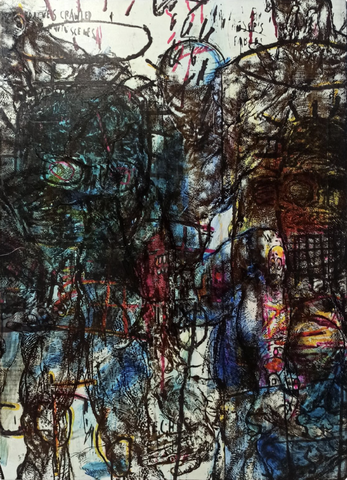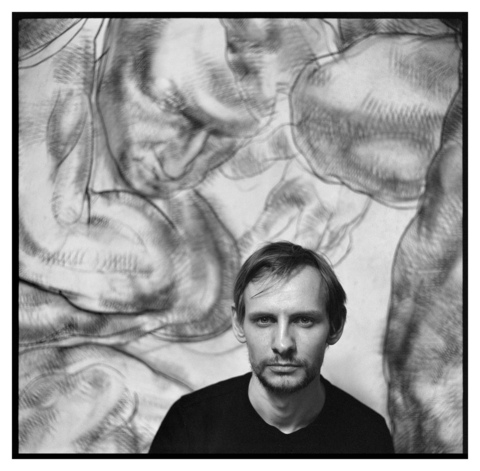
Koteshov Kirill
Born in 1983 in Kemerovo.
Graduated from St. Petersburg State Academy of Art and Industry named after A.L. Stieglitz at the Department of Monumental and Decorative Painting, workshop of Prof. V.G. Lekanov (2004-2010) and Kemerovo Art College at the painting and pedagogical department (1999-2004). The works of the artist are in the Russian Museum.
In his works Kirill considers the idea of globalization as a metaphor for biblical subjects, using a stylistics referring to the aesthetics of the High Renaissance. Koteshov dissects the aesthetics of classical body image, exploring a motif reminiscent of Michelangelo's late sculptures from the Slaves series - spiraling bodies, somewhere unfinished, hardly carved from stone.
The artist also creates industrial landscapes transformed into futuristic images of the city, using Kuzbasslak - coal tar, which refers to the industrial context of his small homeland.
SOLO EXHIBITIONS AND PROJECTS:
- 2024 — “Cosmopera”, a—s—t—r—a gallery, Moscow
- 2010 — “Stolpopotvlenie”, Atelier No. 2 Gallery, Moscow
- 2010 — “Vive la jeune Garde”, Atelier du vent, Rennes
- 2010 — “L'Exposition d'Ilya Gaponov & Kirill Koteshov”, Maison du ventes Leclere, Marseille
- 2010 — “Summer snow”, Maison du Loir-et-Cher, Blois
- 2008 — “Three Days”, Triumph Gallery, Moscow
- 2008 — “The Last Snow”, Globus Gallery, St. Petersburg
- 2008 — “UNDER GROUND”, Manezh, Small Hall, St. Petersburg
- 2007 — “Kuzbass Parallel”, Triumph Gallery, Moscow
- 2007 — “Position”, Museum of St. Petersburg State Art and Design Academy, St. Petersburg
GROUP EXHIBITIONS AND PROJECTS:
- 2025 — Fair |catalog| November, a—s—t—r—a gallery, Moscow, Russia
- 2025 — Cosmoscow, a—s—t—r—a gallery, Moscow, Russia
- 2024 — Fair |catalog| December, a—s—t—r—a gallery, Moscow, Russia
- 2024 — Cosmoscow, a—s—t—r—a gallery, Moscow, Russia
- 2024 — St. Petersburg Art Fair “1703”, a—s—t—r—a gallery, Manezh, St. Petersburg
- 2024 — Fair |catalog| April, a—s—t—r—a gallery, Moscow, Russia
- 2023 — Fair |catalog| December, a—s—t—r—a gallery, Moscow, Russia
- 2023 — Cosmoscow, a—s—t—r—a gallery, Moscow, Russia
- 2023 — St. Petersburg Art Fair “1703”, a—s—t—r—a gallery, Manezh, St. Petersburg, Russia
- 2021 — “Answer 42” in the framework of the International Women's Forum, Kuzbass Ice Palace, Kemerovo, Russia
- 2020 — “Realism: yesterday and today. Art and Truth”, the branch of the Russian Museum in Malaga. Spain, Malaga
- 2020 — “Artists and collectors to the Russian Museum.Gifts.1898 - 2019. Selected” State Russian Museum, St. Petersburg
- 2019 — “Beauty: PLUS-MINUS”, Central Exhibition Hall “Manezh”.
- 2018 — “Project of interregional cooperation in the field of contemporary art NEMOSKVA”
- 2016 — “Ark”, as part of the V International Biennale of Young Art, Moscow.
- 2016 — “Changes”, Ural Vision Gallery, Budapest
- 2015 — “Russia. Realism XXI century”, State Russian Museum, Benois Building, St. Petersburg
- 2014 — “Newer than New” as part of the Baltic Biennale, New Museum, St. Petersburg
- 2014 — “Strictness and Beauty”, Ural Vision Gallery, Yekaterinburg
- 2014 — “The Other Capital”, Moscow Museum, Moscow
- 2014 — “Actual Drawing”, State Russian Museum, St. Petersburg
- 2014 — “Waterline” installation, as part of the parallel program of the biennale “Manifesta10”, Rizzordi art foundation, St. Petersburg
- 2013 — ICONS. Creative space Tkachi. St. Petersburg, Russia
- 2011 — “Gates and Doors”, State Russian Museum, St. Petersburg
- 2010 — ART Moscow, Triumph Gallery, Moscow
- 2010 — “Vive la jeune Garde”, Atelier du vent, Rennes
- 2010 — Summer Snow. Maison du Loir et Cher. Blois, France
- 2010 — “Hero of Our Time”, Moscow International Biennale “Stop! Who's Coming?”
- 2010 — “Futurology”, Garage Center for Contemporary Culture, Moscow.
- 2009 — Kandinsky Prize Exhibition. Louise Blouin Foundation. London
- 2009 — ART Moscow, Triumph Gallery, Moscow
- 2009 — VIII Krasnoyarsk Museum Biennale, Krasnoyarsk
- 2009 — Festival of Contemporary Art ART Zavod, Yekaterinburg (GTSI)
- 2009 — “Topology of Happiness”, Historic Architectural Museum Tsaritsyno, Moscow
- 2009 — “Russian Beauty”, GTSI, Moscow
- 2009 — Europe Art Fair 2009, Geneva, Switzerland
- 2009 — Art Basel Selection, Basel, Switzerland
- 2008 — “Death.net”, Art Gallery “Victoria”, Samara.
- 2008 — “White Space” Gallery, London
- 2008 — Festival of Contemporary Art ART Zavod, Yekaterinburg (GTSI)
- 2008— ART Moscow, Triumph Gallery, Moscow
- 2008 — “Pereuchet” Manege, Small Hall, St. Petersburg
- 2008 — “Memory of Fields”, loft-project “Etazhi”, St. Petersburg
- 2008 — Festival of contemporary art “Snegarry”, Kemerovo
- 2007 — “The Most New”, Atelier Gallery No. 2, Winzavod Center for Contemporary Art, Moscow
- 2006 — Festival of contemporary art “Art - Status”, Kemerovo
- 2006 — First Biennale of Contemporary Art, St. Petersburg
- 2005 — Exhibition of competitive works “The Nutcracker”, Exhibition Hall of the State Opera and Ballet Theater of the St. Petersburg Rimsky-Korsakov Conservatory
- 2003 — Work of the Year, Kemerovo Union of Artists, Kemerovo
ABOUT THE PROJECT “TREE OF LIFE”:
The main goal of the exhibition is to show the specifics of the functioning of drawing in contemporary Russian art. The main focus is on works from the 1990s-2000s, but earlier material, mostly related to conceptualism, is also included. The exhibition demonstrates various ways of actualizing drawing and drawing technique.
The intention of the work reflects the contemporary artist's distrust of the proper degree of grandeur of the space around him. The desire for the “great” inevitably leads to the element of monumental art organized according to classical laws. The idea is realized using the plot of the most daring creative event in the supposed history. The Tower of Babel, not the authentic stone steps of the ancient temple, but its mental construction, has penetrated the structure of memory and language as a multidimensional symbol. The creative act of erecting the tower can be regarded as a pure desire for greatness. The transformation of desire into action generates architectural splendor, allowing man to order nature according to the rules of supports and slabs. The creation of the tower (pillar) is the technological magnification of human civilization, and it continues to this day. Peoples, institutions, cultures and subcultures, overt and covert societies are equivalent as elements of the structure, the removal of one of them provokes instability of the puzzle. The personification of social realities turns into a metaphor of the construction process, where each character becomes an architectural block. It becomes clear that the piled bricks, which fall into place on their own, may not be aware of the existence of the Architect. Meanwhile, there is an Architect. In his role for a moment appears an artist creating virtual architecture. The scale and risk of this endeavor is deliberately high. An enthusiastically begun tower has turned into a construction frozen for lack of funds; a creation of grandiose utility risks turning into an aimless pandemonium of the crowd. And so, as a reminder of the great collapse of great ideas, the spirit of the titanic frescoes of the Renaissance inevitably accompanies the building. Considering the idea of globalization as a metaphor for biblical stories, the author uses a stylistic style that in its formal features refers to the aesthetics of the High Renaissance to build a sharp compositional structure. The body in this work merges one with the other. The body becomes at the same time a living matter, an inanimate object, a fragment, a puzzle, a detail of a mechanism that extends beyond the space of the canvas. By dissecting the aesthetics of the classical image of the body, the author thereby explores a motif that in some ways resembles the moment of Michelangelo's last sculptures from the “Slaves” series - these are spiraled bodies - somewhere unfinished - almost not carved from stone. One can notice such a modernist gesture in them - the body both is and is not. In the same way, the body in Corpus II becomes a kind of refrain and continuation of the classical story of man, his spirit and struggle. The span of time of which we are participants and observers is a time of tectonic shifts of concepts and paradigms, like the Renaissance. Global structures absorb identities, leading to unification - of languages, images, worldviews. But can total equation be avoided? can a compromise between identity and the global emerge? can nations remain? Mixing and equation seems to be inevitable, but polyphony is always deeper and more complex. The paradox of globalization is the realization of identity. The tower cannot be completed. The general will still collapse into the particular.
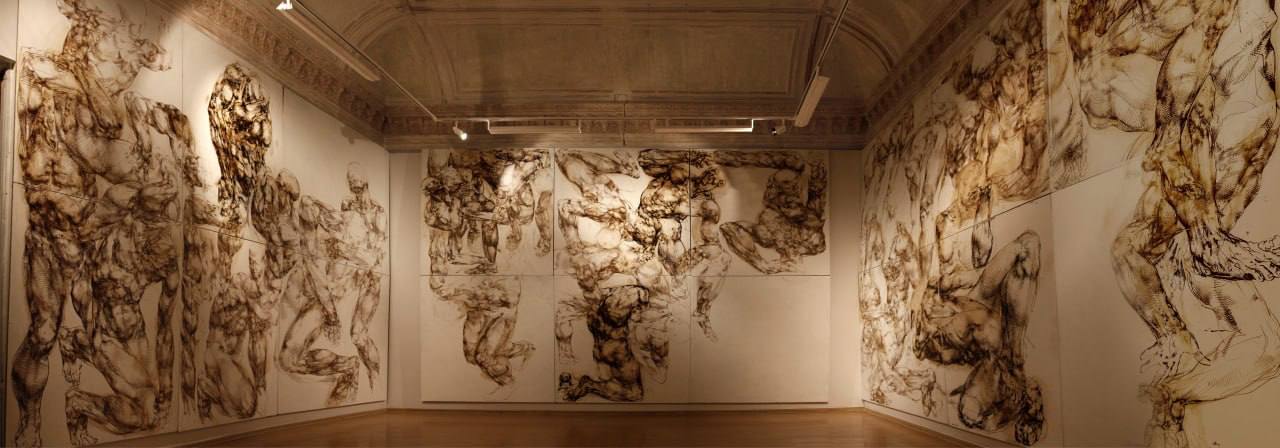
Actual Drawing Exhibition, 2014, Marble Palace, Russian Museum
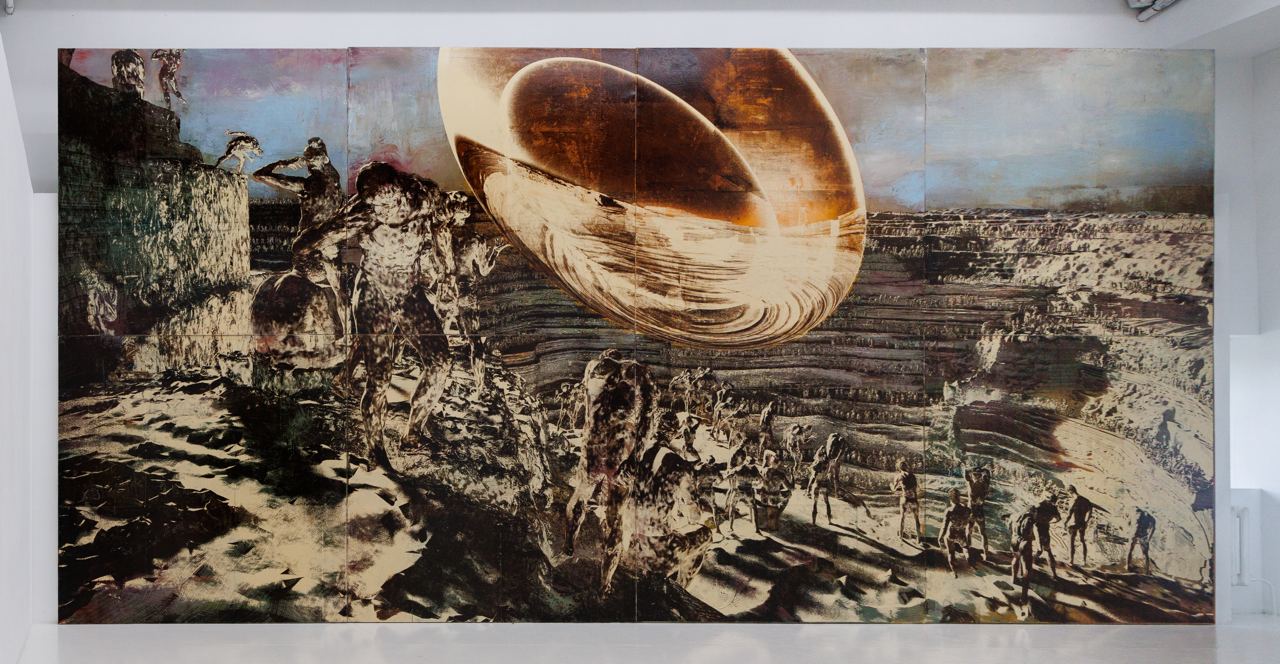
Space Opera” exhibition, a-s-t-r-a gallery, Moscow, 2024
“The Tree of Life is a complex image that exists in various cultures and is one of the monumental symbols of life, the planet and all living things. Kirill Koteshov reinterprets this image in the form of a large pictorial installation, enveloping the entire space and completely absorbing our visual perception. The monumental pictorial installation, which was created in the Russian Museum for the exhibition “Actual Drawing”, really combines monumental painting, which practically turns into wall painting. The drawing is executed so qualitatively that it creates a feeling of the work of old masters, nevertheless, the theme of the Tree of Life and its realization by Kirill Koteshov remain relevant today. In Kirill Koteshov's work, the tree is formed by the intertwined figures of people, the bodies touching and connecting with each other, creating a sense of a tree crown, a monolithic mass moving upwards and uniting all things into a single bond. The bodies are devoid of faces, gender, individual characteristics, but they are physically ideal, perfect and identical. The figures support each other, make each other bend, move, assume certain poses - but all together they form a single chain of being, a life taking shape, a mass that seems indestructible.”
Kirill Koteshov
SELECTED PUBLICATIONS:
- Artguide - Year three: the results of art fair 1703
- Artguide - Cosmoopera. Imaginary Architecture by Kirill Koteshov
- Vedomosti - Classics and contemporaries: four new exhibitions of spring
- BURO - Who's new? Participating artists worth coming to Cosmoscow 2023 for
- Playbill - What to see at the new contemporary art fair |catalog|
Works
